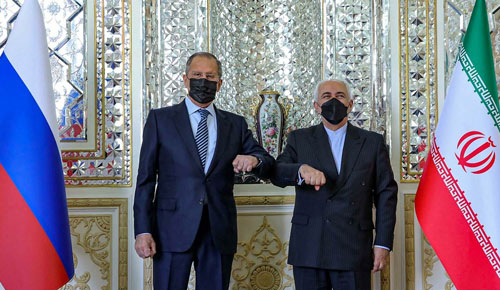Iran and Israel’s shadow war takes a dangerous turn
Tehran
Russian Foreign Minister Sergei Lavrov on Tuesday said Moscow expected the Iranian nuclear deal to be saved and condemned EU sanctions against Iran, adding they could undermine sensitive nuclear talks.
“We expect that it will be possible to preserve the Joint Comprehensive Plan of Action,” Lavrov said after talks with his Iranian counterpart Mohammad Javad Zarif in Tehran, referring to the 2015 nuclear deal.
“As far as we understand, our partners in Tehran have expressed their readiness to immediately move in that direction” if Washington upholds agreements on its end, Lavrov added.
Russia’s top diplomat also criticised recent EU sanctions on Iran, saying they raised “a huge number of questions” while talks aimed at reviving the agreement on curbing Tehran’s atomic ambition were ongoing.
On Monday, the EU added eight Iranian security officials, including the chief of the powerful Revolutionary Guards, and three notorious prisons to a sanctions blacklist over a 2019 protest crackdown.
The move to impose asset freezes and visa bans came at a sensitive time as Brussels mediates efforts in Vienna to revive the nuclear deal between world powers and Tehran.
The long-running and undeclared shadow war between two of the Middle East’s most implacable foes, Iran and Israel, appears to be heating up.
Iran has blamed Israel for a mysterious explosion at the weekend that knocked out power at its uranium enrichment facility at Natanz.
Israel has not publicly said it was behind what Iran calls “an act of sabotage” but US and Israeli media reports are quoting officials as saying it was carried out by Israel’s overseas intelligence agency, Mossad.
Iran has vowed to take revenge “at a time of its choosing”. This is not an isolated incident. It follows a gradually accelerating pattern of hostile, tit-for-tat actions by both countries as they step up their covert war while being careful – so far – to avoid an all-out conflict which would be hugely destructive for both nations.
So, what are the risks here and how is this likely to end? This “shadow war” can be broadly divided into three distinct fronts.
Iran’s nuclear programme Israel does not believe Iran’s repeated assertions that its nuclear programme is a purely peaceful civil one.
Israel is convinced that Iran is secretly working towards developing a nuclear warhead and the means to deliver it with a ballistic missile.
Speaking on Monday during a visit from US Defence Secretary Lloyd Austin, Israeli Prime Minister Benyamin Netanyahu said: “In the Middle East there is no threat that is more serious, more dangerous, more pressing than that posed by the fanatical regime in Iran.” —APP










